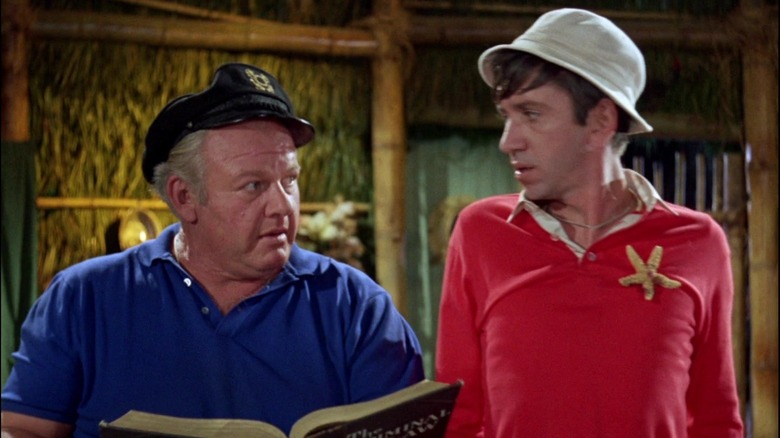How Gilligan's Island Stirred Some Chaos For The Real Coast Guard
The plot of director Dean Parisot's cult-favorite 1999 sci-fi comedy "Galaxy Quest" hinges on a race of extraterrestrials, the Thermians, believing that an '80s space adventure series is a collection of "historical documents" of real-life events. When one of the show's actors, Gwen DeMarco (Sigourney Weaver), tries to explain to them that many TV series are purely fictional, she adds (with more than a hint of exasperation), "Surely, you don't think 'Gilligan's Island' is a ..." before trailing off as she watches the Thermians' faces drop in heartfelt despair. "Those poor people," their leader, Mathesar (Enrico Colantoni), somberly replies.
A naive group of other-worldly beings thinking that Sherwood Schwartz's zany '60s sitcom is really an authentic documentary about an eclectic group of humans — including (sing it with me now), "Gilligan, the Skipper too, the millionaire and his wife, the movie star, the Professor and Mary Ann" — getting shipwrecked on an uncharted isle in the Pacific Ocean makes for a perfect punchline in a parody like "Galaxy's Quest." It's also, miraculously enough, closer to how many people reacted to the show in real life than you'd probably assume. According to Schwartz, the Coast Guard received a shocking amount of telegrams from viewers while the series was on the air, demanding to know why the organization wasn't out there rescuing Gilligan and the gang at this very instant.
This isn't a case of Schwartz having claimed that he'd heard about all this from someone who knew someone in the Coast Guard, either. He knew it for a fact because he'd seen the telegrams himself.
Where did they think the laugh track was coming from?
Most of the time, when people have convinced themselves that a fictional piece of media is anything but, it's because the project itself is meant to seem authentic. This was infamously the case when Italian filmmaker Ruggero Deodato pioneered the found-footage film in 1980 with "Cannibal Holocaust," a grisly exploitation movie that managed to trick numerous people into thinking what they were seeing was real. 19 years after that, history repeated itself (to a degree) with "The Blair Witch Project," the horror film that helped bring found footage further into the mainstream — using a then-novel viral marketing campaign to perpetuate rumors that the movie's footage had, in fact, been recovered and edited after the mysterious disappearance of the trio who captured it.
Bearing in mind that people were even less media-literate in the '60s than they were in the '80s or '90s, you'd still expect most viewers to realize that "Gilligan's Island" was not a documentary thanks to its blatant artificiality ... and for the most part, you'd be correct. Even so, there were enough folks who didn't understand this to cause a headache for the Coast Guard. As Schwartz told the Archive of American Television in 1997 (via Entertainment Weekly), the Guard directly contacted him some 10 weeks after the series premiered. He subsequently found himself with a massive pile of telegrams dumped on his desk, all of them from individuals wondering why the Guard had refused to send so much as a single ship to rescue the passengers and crew of the SS Minnow.
"Now who did they think was laughing at what was happening to these people?" Schwartz said. "Where did they think the music came from, and the commercials?" No doubt, his seeing this as a laughing matter would've greatly confused the Thermians.

